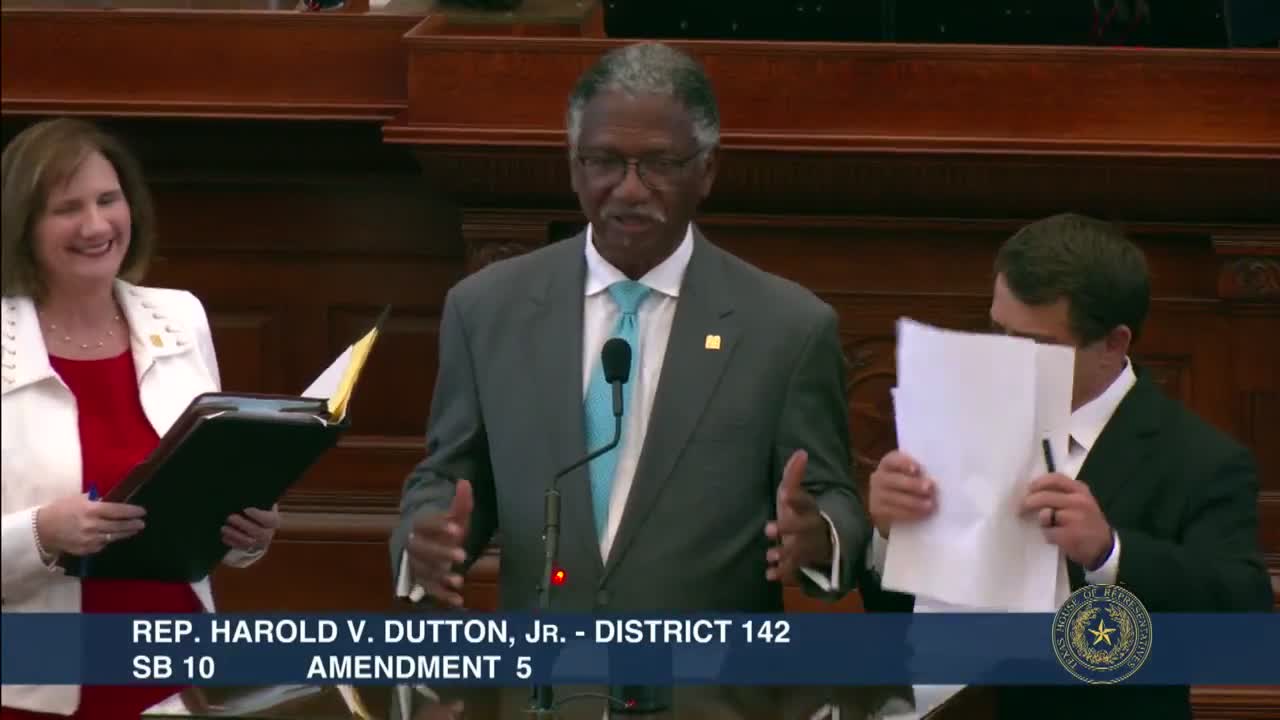Texas Lawmakers Debate Displaying 10 Commandments in Multiple Languages in Classrooms
May 25, 2025 | HOUSE OF REPRESENTATIVES, Legislative, Texas
This article was created by AI summarizing key points discussed. AI makes mistakes, so for full details and context, please refer to the video of the full meeting. Please report any errors so we can fix them. Report an error »

The Texas Legislature convened on May 25, 2025, to discuss a series of amendments related to the teaching of the Ten Commandments in public schools. The primary focus was on an amendment proposed by Representative Dutton, which aimed to not only teach the Ten Commandments but also to present them in five different languages. Dutton argued that this approach would enhance children's learning and cultural awareness, allowing them to understand the commandments in a multilingual context.
Supporters of the amendment emphasized the educational benefits of teaching children multiple languages alongside moral teachings. They highlighted the importance of early language acquisition and the potential for fostering a more inclusive environment in Texas's diverse classrooms. Dutton shared a personal anecdote about his children learning the Ten Commandments in multiple languages, suggesting that such an initiative could enrich students' educational experiences.
However, the amendment faced opposition from Representative Noble, who raised concerns about the practicality and potential confusion arising from multiple translations of the Ten Commandments. Noble argued that the bill should adhere to a single, established version to avoid legal complications and ensure clarity in educational settings. She moved to table the amendment, which ultimately passed with a vote of 83 to 48.
Another significant amendment was introduced by Representative Rosenthal, which sought to ensure that different versions of the Ten Commandments, particularly those from Jewish and Catholic traditions, would be displayed in classrooms if requested by a majority of parents. Rosenthal argued that this would respect the diverse faith backgrounds of students and prevent confusion regarding religious teachings. However, this amendment was also tabled after Noble's motion prevailed.
The discussions highlighted the complexities of integrating religious teachings into public education, particularly in a state as diverse as Texas. Legislators debated the implications of choosing specific versions of religious texts and the potential for legal challenges. The meeting underscored the ongoing tension between educational policy, religious expression, and the rights of parents and students in public schools.
As the session concluded, the fate of the proposed amendments reflected broader societal questions about the role of religion in education and the importance of inclusivity in a multicultural state. The legislature's decisions will likely continue to influence discussions on educational content and religious representation in Texas schools.
Supporters of the amendment emphasized the educational benefits of teaching children multiple languages alongside moral teachings. They highlighted the importance of early language acquisition and the potential for fostering a more inclusive environment in Texas's diverse classrooms. Dutton shared a personal anecdote about his children learning the Ten Commandments in multiple languages, suggesting that such an initiative could enrich students' educational experiences.
However, the amendment faced opposition from Representative Noble, who raised concerns about the practicality and potential confusion arising from multiple translations of the Ten Commandments. Noble argued that the bill should adhere to a single, established version to avoid legal complications and ensure clarity in educational settings. She moved to table the amendment, which ultimately passed with a vote of 83 to 48.
Another significant amendment was introduced by Representative Rosenthal, which sought to ensure that different versions of the Ten Commandments, particularly those from Jewish and Catholic traditions, would be displayed in classrooms if requested by a majority of parents. Rosenthal argued that this would respect the diverse faith backgrounds of students and prevent confusion regarding religious teachings. However, this amendment was also tabled after Noble's motion prevailed.
The discussions highlighted the complexities of integrating religious teachings into public education, particularly in a state as diverse as Texas. Legislators debated the implications of choosing specific versions of religious texts and the potential for legal challenges. The meeting underscored the ongoing tension between educational policy, religious expression, and the rights of parents and students in public schools.
As the session concluded, the fate of the proposed amendments reflected broader societal questions about the role of religion in education and the importance of inclusivity in a multicultural state. The legislature's decisions will likely continue to influence discussions on educational content and religious representation in Texas schools.
View full meeting
This article is based on a recent meeting—watch the full video and explore the complete transcript for deeper insights into the discussion.
View full meeting
